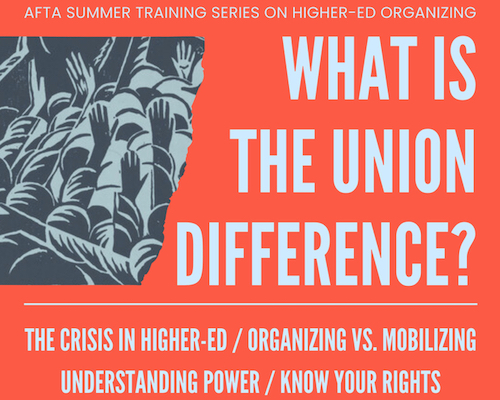Testifying about a range of governance, finance and personnel issues, AFTNJ higher education members and leaders met with the New Jersey Senate Higher Education Committee, chaired by Sen. Sandra Cunningham.
Student Success
AFTNJ Executive Vice President for Higher Education Susanna Tardi and United Adjuncts of New Jersey President Elaine Bobrove testified on conditions for student success.
“If students are our priority, then we have an obligation to focus on a model that defines student success based on individual student goals,” said Dr. Tardi. “Some students have a goal of earning a degree to attain their career goals, others are coming to become certified or maintain certification in a given area, others are seeking to be retrained, and yet others are interested purely in academic enrichment. Public and private colleges and universities have and in my opinion should, retain different missions, however, they all need to not only provide labor force replacements–excellent teachers, nurses, natural and social scientists, business leaders, economists, artists etc., but to agree that student success has a social obligation component. Student success involves enhancing reasoning (critical thinking), ethical behavior, and producing role-models and leaders for the betterment of the citizens of New Jersey and beyond the borders of our state and nation. Measurements for this kind of success cannot be determined solely or even predominantly by some national standardized test scores, student retention statistics, graduation rates or other expedient but not necessarily comprehensive measures. I am in no way suggesting that low graduation rates should be ignored, but rather they be examined within the context of each college and university mission. There needs to be an understanding between the State and the institutions that colleges and universities are not mere ‘diploma mills.'” Dr. Tardi written testimony.
Elaine Bobrove, an adjunct at Camden County College, testified about how the poor treatment of adjunct faculty impacts their ability to maximize their teaching potential. She called on the state to publish position reports setting minimal standards that should be followed to optimize the input and fair treatment of adjuncts. “Such standards would go a long way to furthering student success,” said Bobrove. “In setting such standards, the State should solicit comment and involvement from members of the various groups with whom students interact including adjunct faculty.” Prof. Bobrove written testimony.
Economic Development
Rowan professors Peter Rattigan and Dilip Mirchandani along with Rutgers professor Adrienne Eaton testified about the role that higher education plays in economic development, leveraging limited state funding to create jobs, opportunity and revenue far in excess of the state’s investment.
Dr. Mirchandani cited examples from New York and Connecticut where state support for higher education research projects has yielded far greater private investments in developments of new technology, creating jobs and regional collaboration in specific sectors. ” the economic imperative for investment in public higher education is self evident and is supported by many studies. The benefits for the State and the NJ workforce are numerous and sustained,” he said. Dr Mirchandani full testimony.
Effective teaching itself is an economic asset to the state in terms of developing educated, competent, innovative, and creative graduates who improve the economy and community as they enter the job market and influence many/all sectors of it, according to Dr. Rattigan. “Earning a degree in itself is a benefit to the economy,” he said. “A person with an undergraduate degree will earn in their career on average $1.42 million over 40 years. The figure for a high school graduate is $770,000, or $650,000 less.” He continued,”People who earn a graduate degree on average earn more over a 40-year career than those with only an undergraduate degree, $1.6 million on average.” Dr. Rattigan written testimony.
State support for higher education goes a long way in generating the ability to access grant money, according to Dr. Eaton. “Seventy-seven percent of the research money brought into Rutgers comes from federal research grants,” she said. “The federal research dollars won by Rutgers has increased exponentially over the last two decades. This amounts to a return to New Jersey of our federal tax dollars. Like other affluent states, our state generally sends more to Washington than we get back. We can continue to build on this record of grant-getting but not without proper state investment.” Dr. Eaton written testimony.
Dr. Eaton, a professor at Rutgers School of Management and Labor Relations, also testified from her perspective as a labor relations professor that the state’s higher education institutions have a lot to learn about establishing good labor relations which will help attract and retain skilled faculty and staff.
Future of Higher Education
Library professor Dan O’Connor from Rutgers School of Communication and Information noted that higher education institutions produce rich data about their programs and outcomes. “However, the data produced by our institutions is neither examined nor used in a systematic planning process to make strategic decisions regarding the future of higher education in New Jersey,” said Dr. O’Connor. “We can allow our colleges and universities independence but with the caveat that someone needs to address how they might coordinate, cooperate, and communicate across their boundaries for the greater good of our students and our citizens. Our faculties have tremendous expertise in these areas and we are willing to assist you in such a process,” he said to the panel. Dan O’Connor full testimony.



